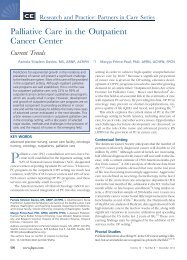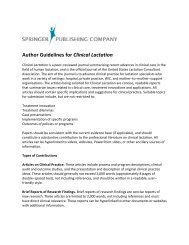Mentoring in Nursing - Springer Publishing
Mentoring in Nursing - Springer Publishing
Mentoring in Nursing - Springer Publishing
Create successful ePaper yourself
Turn your PDF publications into a flip-book with our unique Google optimized e-Paper software.
1: mentor<strong>in</strong>g: the evolvement of a network of mentors 21<br />
These advantages are helpful to the mentor, mentee, organization,<br />
and the profession. Peluchete and Jeanquart (2000) describe the impact<br />
mentors have by connect<strong>in</strong>g students and novices to the correct person<br />
for career success. Another advantage for mentors is that by mentor<strong>in</strong>g,<br />
they develop <strong>in</strong>creased credibility <strong>in</strong> the organization (Gilley &<br />
Boughton, 1996). One can ga<strong>in</strong> credibility by delegat<strong>in</strong>g work appropriately,<br />
provid<strong>in</strong>g specific and timely performance feedback, help<strong>in</strong>g<br />
employees identify work objectives for improvement, and demonstrat<strong>in</strong>g<br />
acceptable professional behavior.<br />
S<strong>in</strong>etar (1998) warns there are disadvantages of mentor<strong>in</strong>g if<br />
“unhealthy mentors” attempt to manipulate mentees. Certa<strong>in</strong>ly it is<br />
possible for mentors to treat mentees without dignity and respect.<br />
Although the mentors may appear ultra-aggressive and confident,<br />
usually these mentors are <strong>in</strong>timidated and have very low self-esteem.<br />
Therefore, these types of <strong>in</strong>dividuals should be quickly identified<br />
as unsuitable mentors who are actually <strong>in</strong> need of a mentor—or at<br />
least guidance—for themselves. People who are this <strong>in</strong>secure at a<br />
later stage of their careers may not be candidates for participat<strong>in</strong>g<br />
<strong>in</strong> a mentor<strong>in</strong>g partnership s<strong>in</strong>ce they cannot share and will do too<br />
much harm to their mentors or their mentees and themselves. There<br />
are also <strong>in</strong>dividuals who have been mentored and helped along the<br />
way who do not have any realization of it at all, or at least cannot<br />
admit that they have been mentored and have not climbed the ladder<br />
solely on their own. These <strong>in</strong>dividuals should not be tapped as<br />
mentors either.<br />
There are other disadvantages as well, such as personality <strong>in</strong>compatibility,<br />
power-monger<strong>in</strong>g mentors, and situations <strong>in</strong> which mentors<br />
are resentful of their mentees and make trouble for them that can<br />
sabotage their careers. Simon and Eby (2003) present f<strong>in</strong>d<strong>in</strong>gs that provide<br />
a description of negative mentor<strong>in</strong>g experiences that they have<br />
collected. These relationships can vary <strong>in</strong> severity and frequency and<br />
may be characterized by m<strong>in</strong>or obstructionism (e.g., not return<strong>in</strong>g<br />
phone calls), hostility (e.g., talk<strong>in</strong>g negatively about someone beh<strong>in</strong>d<br />
his or her back), or serious overt aggression (e.g., physical attack).<br />
Possessiveness, jealousy, credit tak<strong>in</strong>g, deceit, and abuse, both psychological<br />
and physical, can occur <strong>in</strong> mentor<strong>in</strong>g relationships.<br />
CONCLUSION<br />
As one realizes the significance that mentor<strong>in</strong>g can have on some <strong>in</strong>dividuals,<br />
it becomes more readily understood that perhaps there is someth<strong>in</strong>g<br />
to what people say when they describe their mentorship: “I still
















